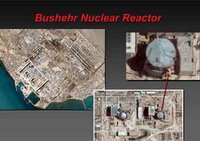 As reported by international media, US and EU relations with Iran have recently turned for the worse because of Iran's unilateral decision to resume its nuclear programme. Iran thus becomes in breech of an EU-brokered agreement on a moratorium on its nuclear programme. As the US and EU - in fear that Iran is trying to develop nuclear weapons - now consider turning to the UN Security Council to impose sanctions on Iran, Russia is actively trying to hold back the West. What is Russia's interest in this?
As reported by international media, US and EU relations with Iran have recently turned for the worse because of Iran's unilateral decision to resume its nuclear programme. Iran thus becomes in breech of an EU-brokered agreement on a moratorium on its nuclear programme. As the US and EU - in fear that Iran is trying to develop nuclear weapons - now consider turning to the UN Security Council to impose sanctions on Iran, Russia is actively trying to hold back the West. What is Russia's interest in this?At his recent summit with German Chancellor, Angela Merkel, president Putin urged the EU to go easy on Iran, as concerns the country's resumption of its nuclear programme. However, there is no great disagreement between Russia and "the West" on the issue at hand - a critical stance on Iran's action. Still, Russian attempts to hold the West back continue. Only today, Russian foreign minister, Mr. Sergey Lavrov, heavily criticised any attempts to impose sanctions on Iran.
The reason for Russia's position on Iran is not mainly political but economic. Russia and previously the Soviet Union have been instrumental in the construction of Iran's nuclear programme. Russian nuclear exports to Iran has been a great source of income for a domestically faltering nuclear industry. Russian nuclear industry, headed by the nuclear ministry (Minatom), have seen exports as a way to survive the economic turmoil of the 1990's. Heavily oversized, Russian nuclear energy is, however, a sector which breathes a certain extent of optimism.
The reason for this is the same as the reason for Russia's position on the Iranian nuclear programme: Russia's nuclear industry is one of the few technically advanced sectors where Russia can still compete for shares on the international market with other technically developed states. Russia's ability to compete relates to a combination of low costs and high technical skills that no other actor on the arena may offer. Nuclear exports is thus of strategic interest for Russia. International action against Iran's nuclear programme would, consequently, hit Russia's position on the international nuclear energy market.
One may, of course, seek other reasons for Russian restraints on sanctions against Iran such as balance of power and preventing further US power in the Greater Middle East. At the end of the day, economic reasons are the most important. In Moscow, money talks and politics comply.



No comments:
Post a Comment